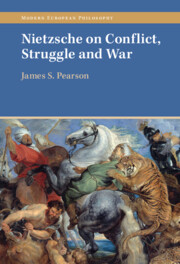Book contents
- Nietzsche on Conflict, Struggle and War
- Modern European Philosophy
- Nietzsche on Conflict, Struggle and War
- Copyright page
- Contents
- Abbreviations
- Translations
- Acknowledgments
- Introduction
- Part I Agon Versus War
- Part II The Struggle for Organization
- Chapter 3 Conflictual Unity in the Untimely Meditations
- Chapter 4 Organizational Struggle in the Later Nietzsche
- Conclusion
- References
- Index
Chapter 3 - Conflictual Unity in the Untimely Meditations
from Part II - The Struggle for Organization
Published online by Cambridge University Press: 16 June 2022
- Nietzsche on Conflict, Struggle and War
- Modern European Philosophy
- Nietzsche on Conflict, Struggle and War
- Copyright page
- Contents
- Abbreviations
- Translations
- Acknowledgments
- Introduction
- Part I Agon Versus War
- Part II The Struggle for Organization
- Chapter 3 Conflictual Unity in the Untimely Meditations
- Chapter 4 Organizational Struggle in the Later Nietzsche
- Conclusion
- References
- Index
Summary
According to Nietzsche, modern individuals and societies are pathologically fragmented. In this chapter, I examine the form of conflict that he prescribes in his Untimely Meditations (UM) as a remedy to this condition of disintegration. I argue that he develops a quasi-Schopenhauerian model of how healthy holism arises – that is to say, a model that presupposes the existence of metaphysical essences or Ideas that teleologically organize entities from within. Such essences establish holism by means of selectively overpowering and assimilating the opposed entities that they need in order to materially realize themselves. On the basis of this analysis, I reject agonistic readings of UM,arguing that Nietzsche endorses exploitation and exclusion in a way that is sharply at odds with his conception of the agon. I conclude the chapter with an account of how Nietzsche’s eventual rejection of metaphysics (in his middle and later writings) undermines the metaphysical presuppositions that condition the synthetic program that he outlines in UM.
- Type
- Chapter
- Information
- Nietzsche on Conflict, Struggle and War , pp. 143 - 183Publisher: Cambridge University PressPrint publication year: 2022



